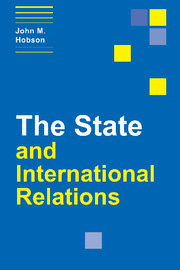Book contents
- Frontmatter
- Contents
- List of figures
- Acknowledgements
- 1 What's at stake in the ‘second state debate’? Concepts and issues
- Part 1 Traditional theories of the state and international relations
- 2 Realism
- 3 Liberalism
- Part 2 Recent sociological theories of the state and international relations
- Part 3 Conclusion: proposing a ‘structurationist’ theory of the ‘constitutive’ state and global politics
- References
- Index
3 - Liberalism
Published online by Cambridge University Press: 31 March 2010
- Frontmatter
- Contents
- List of figures
- Acknowledgements
- 1 What's at stake in the ‘second state debate’? Concepts and issues
- Part 1 Traditional theories of the state and international relations
- 2 Realism
- 3 Liberalism
- Part 2 Recent sociological theories of the state and international relations
- Part 3 Conclusion: proposing a ‘structurationist’ theory of the ‘constitutive’ state and global politics
- References
- Index
Summary
I argue that it is possible to discern five basic variants of liberalism which are situated within two categories: individual-centric liberalism, comprising classical liberalism, new liberalism and functionalism; and state-centric liberalism which comprises English school rationalism and neoliberal institutionalism. I suggest that new liberalism (though not functionalism) constitutes the ‘via media’ between classical liberalism and modern ‘state-centric’ liberalism. There are perhaps three fundamental traits that define the rational kernel or essence of the liberal theory of the state and of political institutions more generally:
(1) The theory of the socially-adaptive state: the prime directive of state behaviour is to meet the economic and social needs of individuals. Rather than technically conform to anarchy (as in neorealism), states must ultimately conform to the needs of individuals: states must be socially adaptive.
(2) Socially adaptive states have high international agential power and can buck the logic of anarchy: paradoxically by conforming to the economic and social requirements of individuals, states are able to buck the logic of anarchy and inter-state competition thereby creating a peaceful world. In the process, the international realm is redefined as a realm of possibility, which enables states to maximise global welfare and create peace. While neorealism prescribes that states should be primarily concerned to gain ‘technical control’ in a hostile anarchic environment, liberals prescribe that states should pursue a ‘practical’ rationality, by which states come to create a peaceful, cooperative and orderly world.
(3) Only the ‘appropriate’ institutions (domestic and international) can achieve the desired ends of global welfare and peace: inappropriate domestic and international institutions lead to diminishing global and national welfare, as well as war.
- Type
- Chapter
- Information
- The State and International Relations , pp. 64 - 106Publisher: Cambridge University PressPrint publication year: 2000



